Acupuncture
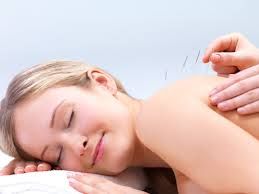 Acupuncture is one of the oldest, most commonly used forms of medicine in the world. Originating in China more than 2,500 years ago, acupuncture is currently one of the most thoroughly researched, practiced, and respected forms of complementary medicine available anywhere. According to Traditional Chinese Medicine, your overall health is determined by the quality of the Qi (energy) flow through the natural pathways of your body (meridians). Acupuncture uses a variety of techniques, including placing very thin sterile needles into specific points on the body, to stimulate and improve your Qi flow.
Acupuncture is one of the oldest, most commonly used forms of medicine in the world. Originating in China more than 2,500 years ago, acupuncture is currently one of the most thoroughly researched, practiced, and respected forms of complementary medicine available anywhere. According to Traditional Chinese Medicine, your overall health is determined by the quality of the Qi (energy) flow through the natural pathways of your body (meridians). Acupuncture uses a variety of techniques, including placing very thin sterile needles into specific points on the body, to stimulate and improve your Qi flow.
The many benefits of acupuncture include:
- Pain reduction
- Stress and tension relief
- Increased energy levels
- Stronger digestion
- Relief from bad habits and addictions
- Greater sense of overall health and well-being
Electroacupuncture
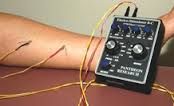 Electroacupuncture is a highly effective holistic treatment for pain, nausea, and chronic ailments. In practice, it is actually very similar to traditional acupuncture. Using the exact same system of Chinese Medicine, I insert very thin and sterile needles into specific points along the meridians of your body. I then attach the needles to a device that delivers gentle electrical pulses between two points. This helps restore the healthy flow of Qi (energy) through your body, removing any blockages and clearing out stagnant areas, thus creating a stronger and clearer experience of health and well-being.
Electroacupuncture is a highly effective holistic treatment for pain, nausea, and chronic ailments. In practice, it is actually very similar to traditional acupuncture. Using the exact same system of Chinese Medicine, I insert very thin and sterile needles into specific points along the meridians of your body. I then attach the needles to a device that delivers gentle electrical pulses between two points. This helps restore the healthy flow of Qi (energy) through your body, removing any blockages and clearing out stagnant areas, thus creating a stronger and clearer experience of health and well-being.
Pulse Diagnosis
 One of the most common questions that patients ask about Chinese Medicine is: “Why does my practitioner check my pulse?” Pulse diagnosis is actually one of the most complex and important diagnostic techniques we use in Chinese Medicine. Through feeling and evaluating your pulse, I obtain an accurate diagnosis of your overall constitution, Qi (energy) flow, and internal organ health, among other things. I then synthesize all of this information into a highly effective and individualized treatment plan for your specific needs.
One of the most common questions that patients ask about Chinese Medicine is: “Why does my practitioner check my pulse?” Pulse diagnosis is actually one of the most complex and important diagnostic techniques we use in Chinese Medicine. Through feeling and evaluating your pulse, I obtain an accurate diagnosis of your overall constitution, Qi (energy) flow, and internal organ health, among other things. I then synthesize all of this information into a highly effective and individualized treatment plan for your specific needs.
Tongue Diagnosis
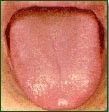 When examining the tongue, the Chinese medicine doctor looks at the color of the tongue body, its size and shape, the color and thickness of its coating or fur, locations of abnormalities and moistness or dryness of the tongue body and fur. These signs reveal not only overall states of health, but correlate to specific organ functions and disharmonies, especially in the digestive system. Not all tongue irregularities are indications of disharmony, however. Food and drugs may change the coating or color of the body of the tongue. For example, coffee yellows the coating and Pepto-Bismol turns the tongue black.
When examining the tongue, the Chinese medicine doctor looks at the color of the tongue body, its size and shape, the color and thickness of its coating or fur, locations of abnormalities and moistness or dryness of the tongue body and fur. These signs reveal not only overall states of health, but correlate to specific organ functions and disharmonies, especially in the digestive system. Not all tongue irregularities are indications of disharmony, however. Food and drugs may change the coating or color of the body of the tongue. For example, coffee yellows the coating and Pepto-Bismol turns the tongue black.
Chinese Herbology
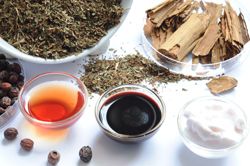 Chinese herbal medicine is a 2,000 year old tradition using naturally occurring substances — including herbs — to enhance one’s health and vitality. As opposed to Western medicine, the foundation of this approach is to support the body’s natural self-healing mechanisms and abilities.
Chinese herbal medicine is a 2,000 year old tradition using naturally occurring substances — including herbs — to enhance one’s health and vitality. As opposed to Western medicine, the foundation of this approach is to support the body’s natural self-healing mechanisms and abilities.
Since each patient has different needs, I carefully select herbal formulas that combine a variety of herbs that will synergistically blend together to achieve optimal results for your unique situation. I prescribe high-quality, professional-grade herbal medicines that are available only to qualified licensed professionals.
Fertility Treatments
 Acupuncture is quickly becoming more popular among couples to address fertility concerns today due to the fact that the stress of modern day living may be contributing to infertility. Couples today are facing constant stress from work, finances, or other obstacles in life, such as poor sleeping patterns, improper dietary and lifestyle choices not to mention the increased use of stimulants being consumed in order to enhance work productivity, while reproductivity is usually comprised. For the 4.5 million couples experiencing infertility issues each year, acupuncture might just be what the doctor ordered. Today, even high-tech reproductive specialists are looking to the somewhat mysterious world of Chinese medicine to help those fertility patients for whom western science alone is not quite enough.
Acupuncture is quickly becoming more popular among couples to address fertility concerns today due to the fact that the stress of modern day living may be contributing to infertility. Couples today are facing constant stress from work, finances, or other obstacles in life, such as poor sleeping patterns, improper dietary and lifestyle choices not to mention the increased use of stimulants being consumed in order to enhance work productivity, while reproductivity is usually comprised. For the 4.5 million couples experiencing infertility issues each year, acupuncture might just be what the doctor ordered. Today, even high-tech reproductive specialists are looking to the somewhat mysterious world of Chinese medicine to help those fertility patients for whom western science alone is not quite enough.
Acupuncture can increase fertility by multi-faceted means for both women and men such as:
- Reducing stress and increasing blood flow to the reproductive organs as well as balancing the endocrine system. This can regulate the woman’s menstrual cycle via correcting any hormonal imbalances.
- Enhance follicular development in order to improve the females egg quality.
Thicken the uterine lining so when fertilisation of an egg has occurred, the uterus is ready to assist in implantation of the embryo. - Acupuncture can also improve the general health of a woman which can reduce possible inflammatory presentations caused by other illnesses which can also contribute to infertility.
- In relation to IVF, modern day research has found that acupuncture can improve the success of fertility by 40 – 60 per cent when administered before and after embryo transfer.
- For men, acupuncture can improve sperm quality and enhance sperm count, motility, and abnormality. Acupuncture addresses these health concerns and assists with improving general health leading to improved sperm quality.
- Stress is also dealt with in men as this too can negatively affect sperm which may promote infertility in men.
Clinical observations from the Berkley Center for Reproductive Wellness suggest that the most effective fertility treatments involve a combination of acupuncture, herbal medicine, and traditional medicine. However, conception often occurs when only acupuncture and herbal medicines are used without traditional medical interventions.
“Acupuncture works to restore the flow of Qi — your essence, your body energy — so with regards to infertility, treatment has a calming, restorative effect that increases a sense of well- being and ultimately helps the body to accept the creation of life,” says acupuncturist Ifeoma Okoronkwo, MD, a professor of medicine at New York University School of Medicine.
Naturopathic Botanical Medicine
 Naturopathic botanical medicine is a vital component of the healing arts that draws on the accumulated and developing knowledge of the medicinal properties of plants in the prevention and treatment of disease. Western botanical medicine includes medical herbalism, a healing art that relies on the synergistic and curative properties of plants to treat symptoms and disease and maintain health, and pharmocognosy, the study of natural products. Botanical medicine is an important component of numerous traditional medical systems and therapies, including traditional Chinese medicine (TCM), Ayurvedic medicine, naturopathy, indigenous and shamanic medicine, homeopathy, flower essence therapy, and aromatherapy. Botanical medicine has survived for many thousands of years in some form and in all cultures throughout the world. The study of the plant lore of these various cultures is known as ethnobotany.
Naturopathic botanical medicine is a vital component of the healing arts that draws on the accumulated and developing knowledge of the medicinal properties of plants in the prevention and treatment of disease. Western botanical medicine includes medical herbalism, a healing art that relies on the synergistic and curative properties of plants to treat symptoms and disease and maintain health, and pharmocognosy, the study of natural products. Botanical medicine is an important component of numerous traditional medical systems and therapies, including traditional Chinese medicine (TCM), Ayurvedic medicine, naturopathy, indigenous and shamanic medicine, homeopathy, flower essence therapy, and aromatherapy. Botanical medicine has survived for many thousands of years in some form and in all cultures throughout the world. The study of the plant lore of these various cultures is known as ethnobotany.
Plants have been used since prehistoric times as medicinal remedies applied in various ways to provide relief from irritations as minor as a mosquito bite to situations as catastrophic as the plague. In modern medicine, some drugs are derived from plants, and many of these medicines are used in ways that are similar to their traditional uses. Many more drugs in modern medicine, however, are synthetic, and part of the reason for this trend is economic: plants can rarely be patented, so a pharmaceutical company will not gain the exclusive right to sell a plant-derived medication even after expensive research and marketing. Also, the processing of plants into a medicine cannot be as easily standardized and controlled as the manufacturing of a synthetic. As a result, the efficacy and safety of only a relative few of the traditionally used botanical remedies have been verified by clinical research. Approximately only 5,000 of the estimated 500,000 known species (including subspecies) of plants have been identified and studied for their medicinal properties.
Homeopathic Medicine
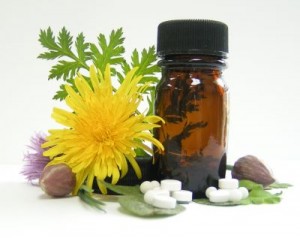 Homeopathy is a system of medicine which involves treating the individual with highly diluted substances, given in tablet or tincture form, with the aim of triggering the body’s natural system of healing. Based on specific symptoms, homeopathy strives to match the most appropriate medicine to each patient. Homeopathy is based on the principle that you can treat ‘like with like’, that is, a substance which causes symptoms when taken in large doses, can be used in small amounts to treat those same symptoms. Homeopathic medicines (which homeopaths call remedies) are prepared by specialist pharmacies using a careful process of dilution and succussion (a specific form of vigorous shaking). Homeopathy was discovered by a German doctor, Samuel Hahnemann, who, shocked with the harsh medical practises of the day looked for a way to reduce the damaging side-effects associated with medical treatment.
Homeopathy is a system of medicine which involves treating the individual with highly diluted substances, given in tablet or tincture form, with the aim of triggering the body’s natural system of healing. Based on specific symptoms, homeopathy strives to match the most appropriate medicine to each patient. Homeopathy is based on the principle that you can treat ‘like with like’, that is, a substance which causes symptoms when taken in large doses, can be used in small amounts to treat those same symptoms. Homeopathic medicines (which homeopaths call remedies) are prepared by specialist pharmacies using a careful process of dilution and succussion (a specific form of vigorous shaking). Homeopathy was discovered by a German doctor, Samuel Hahnemann, who, shocked with the harsh medical practises of the day looked for a way to reduce the damaging side-effects associated with medical treatment.
Nutritional Medicine and Functional Nutrition
 Nutritional Medicine and Functional Nutrition is a branch of Naturopathic and Functional Medicine that utilizes patient specific diagnostic and treatment protocols to address underlying nutritional and lifestyle imbalances that are involved in individual health problems as well as to promote general health & well-being and for prevention of health related issues and also to improve poor genetic expression.
Nutritional Medicine and Functional Nutrition is a branch of Naturopathic and Functional Medicine that utilizes patient specific diagnostic and treatment protocols to address underlying nutritional and lifestyle imbalances that are involved in individual health problems as well as to promote general health & well-being and for prevention of health related issues and also to improve poor genetic expression.
Functional Medicine is a modern system of health care involved with diagnosis, treatment, and prevention of many health related conditions as well as focusing on increasing general health and well-being through utilizing therapeutic, patient-centered protocols and practices. Functional Medicine practitioners utilize a variety of functional diagnostic tools to assess each individual’s health status to allow for specific treatment programs.
Functional Medicine and Clinical Nutrition Goals:
- To establish and maintain general health & well-being and to prevent illness through natural health care approaches.
- Focus on restoring and maintaining optimal health by addressing and restoring physiological functions, when possible, utilizing specific clinical nutritional/herbal, and lifestyle practices.
- Detecting stressors to the immune system through evaluation and functional diagnostic testing. A further goal is then to focus on protocols to help strengthen and allow for proper immune system function.
- Focuses on identifying and addressing underlying causes of chronic health problems and concerns based on nutritional, lifestyle, and environmental factors.
- Emphasis is on treating each patient according to their unique and specific health history, concerns, and needs.
- To offer effective and natural complementary and alternative approaches to modern pharmaceutical based health care.
Common Health Issues Addressed by Functional Medicine and Clinical Nutrition:
- Digestive and Bowel Problems
- Joint & Muscular Pain & Inflammation
- Headaches (Migraine, tension, etc)
- Blood Sugar Imbalances
- Cardiovascular Health
- Cholesterol/Lipid Imbalances
- Hormone Imbalances: Adrenal, Thyroid, Female, Male
- Menstrual & Menopausal Imbalances (PMS, hot flashes, etc)
- Sinus & Respiratory Problems
- Immune & Autoimmune Conditions
- Fatigue, Anxiety, Mood Imbalances
- Sleep Imbalances
- Certain skin conditions
- Preventative Health & Wellness counseling


